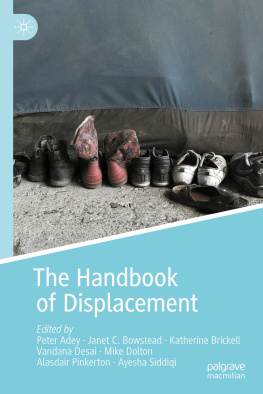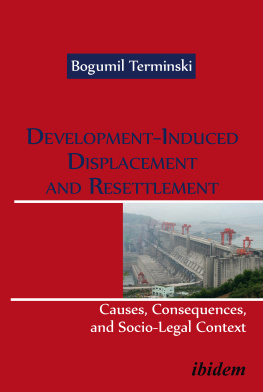LONGING FOR HOME
M. JAN HOLTON
Longing for Home
Forced Displacement and Postures of Hospitality

Copyright 2016 by M. Jan Holton.
All rights reserved.
This book may not be reproduced, in whole or in part, including illustrations, in any form (beyond that copying permitted by Sections 107 and 108 of the U.S. Copyright Law and except by reviewers for the public press), without written permission from the publishers.
Yale University Press books may be purchased in quantity for educational, business, or promotional use. For information, please e-mail (U.K. office).
Set in Janson Oldstyle type by Newgen North America.
Printed in the United States of America.
Library of Congress Control Number: 2015955618
ISBN: 978-0-300-20762-0 (cloth : alk. paper)
A catalogue record for this book is available from the British Library.
This paper meets the requirements of ANSI/NISO Z 39.48-1992 (Permanence of Paper).
10 9 8 7 6 5 4 3 2 1
This book is dedicated to all displaced persons whose hearts continue to long for a place called home.
In Memory
Betty Ann Holton
CONTENTS
ACKNOWLEDGMENTS
I am deeply grateful to many for their time, support, and efforts of all kinds, which have made the writing of this book possible. The International Rescue Committee, Goma office, in the Democratic Republic of the Congo (DRC) offered valuable and kind hospitality during my initial fieldwork in the region. To Mading Arou, Achouth Kur, Pastor Othniel Mweniyamba, residents of the Wilson Inn, and the countless people I have met on roadsides, in fields, and at refugee campsthank you for your trust and your stories; they are gifts beyond measure.
Many friends and family have championed this work during its writing and held steadfast when my own life was touched by displacement. Thank you, Nora Tubbs Tisdale, for envisioning with me what it means to lean into God and for letting me bear witness to the home you make along with your dear husband and my friend, Alfred Tisdale. Dale Peterson, you, too, have taught me, as I have witnessed your generosity and commitment regarding all things regarding home and the loving of family. I am grateful. Vida Maralani, Doug McKee, Roxana, and Ava, thank you for letting me be Aunt JanJan. Dawn Colapietro, dear friend and best cheerleader, I am deeply thankful for you. For my mother, Betty Holton, thank you for letting me share your story of a heavenly home that called to you and where you now rest. My entire family and many friends all have given in ways both small and large to advocate for me as I carried the heart of this work to its fruition. For all, I give thanks.
Kaudie McLean has traveled many roads with me and encouraged my voice at every turn. Rona Johnston Gordon has offered gifts toward this books production of which I am simply in awe. It is a bonus to be blessed by your friendship. Carrie McDaniel has graciously helped me navigate two difficult Institutional Review Board (IRB) protocols at Yale University through their acceptances and numerous reviews. Willis Jenkins introduced me, almost quite literally, to the Batwa of Bwindi. Harry Attridge has been generous with his kindness; I am grateful for his support and leadership. Volney Gay has offered unwavering support of my work and career and, when asked, just the appropriate dose of practical advice. This book has been greatly improved by the many colleagues who have read drafts and offered comments. Yale Divinity School colleagues and friends Lisa Huck, Mary Clark Moschella, Grace Pauls, Carolyn Sharp, and Tom Troegerthank you for accompanying me.
I am very appreciative of Jennifer Banks and Yale University Press for seeing promise in this work even in its early stages. My field research in Sudan and the Congo would not have been possible without generous financial support from Yale Divinity School and the Lilly Theological Scholars Grant. This book was published with the assistance of the Frederick W. Hilles Publication Fund of Yale University.
INTRODUCTION
I met Pricilla in Kakuma Refugee Camp in Kenya in 2003 while doing research with Dinka refugees from South Sudan.In 2008, after the end of the war, many of those refugees, including Pricilla, had returned to their home villages. Now, here I was in Bor, South Sudan, five years after our first meeting, sitting on a tree stump next to the sad little lean-to that was her home. She greeted me with a recited verse, 5:3 from the Gospel of Matthew.
I was thrilled to find her familiar face. She was very generous to talk with me that evening. It was dusk, and she was standing a long and familiar vigil over her corn patch. It begins when the sun starts its decline and continues until night finally falls. I can still hear the distant thp, thp sound of the marble-sized mud balls she hurled at the birds perched to feed on her corn stalks.
In many ways Pricilla represents hundreds of people I have met in my many years of studying communities of violence and disaster. Having fled the war in Sudan and spent fifteen years of difficult life in a camp, Pricilla knows about loss of home and loved ones, suffering and grief. Like women from the Congo, Bosnia, Nicaragua, and elsewhere, she had great hope for her children when they were born, mourned the death of some during the war, and in its aftermath hoped that at least one of her surviving children might return to provide some comfort for her old age. Pricilla lives with the disappointment that her eldest son will not be the one to do this. He is now a U.S. citizen but suffers from alcoholism and is unable to send her money to buy food or supplies for building a house.
Still, she awakes each day with a faith in God and a sense of hope about what the future holds. Some days are bad, very bad. But she and millions of others like her get up every day and go about their livestrying to feed children, care for neighbors, and worship God. They have survived awful events and yet continue to move through each day believing in something beyond the loss and suffering they have experienced.
It is with Pricilla and the others in mind that I write this book about displacement, forced displacement to be precise, and the costs it inflicts on the human spirit. Pricilla and others compel me to ask deep questions about home and homecoming, and why both are fundamental to our lives and our identity.
Blessed are the poor in spirit, for theirs is the kingdom of heaven.
Matthew 5:3
Forced displacement is an urgent and global humanitarian concern that has deep theological and psychological implications. Due to war and poverty, more than 200 million people around the world are without home, and millions more live on the threshold of becoming homeless. Many social scientists and scholars examine the causes of homelessness and displacement. I do something different: I explore the psychological and theological impact of losing ones home place. I ask two questions: what is it about home that makes its loss so profound, and how should we think about this theologically?
The loss of home threatens how we make sense out of the world and takes away our feeling of belonging somewhere with regard to both people and place. Losing home jeopardizes intimate and sustaining relationships; it shifts ones status among the larger community. It also jeopardizes ones sense of physical and psychological safety. Home at its very best creates the conditions that help us trust in a benevolent world and its creator. It can help us lean into God, trust in a faithful God who bears us up during difficult times. Loss of home, then, can prematurely disrupt the nurturing of this relationship. All of these effects can impede the processes toward physical, psychological, and spiritual flourishing for the displaced.
Next page




